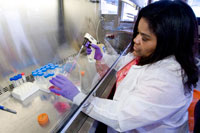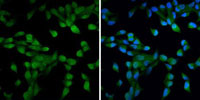 |
 |
|
 |
 |
 |
 |
 |
|
 |
 |
 |
 |
August 17, 2009
A Natural Product Gives Hope for Slowing Prostate Cancer MBL Visiting Researcher Kimberly Jackson studies how a compound from licorice root works in prostate cancer cells
By Julia Darcey
 |
 |
 |
Photos:
Click thumbnail for larger image:

Dr. Kimberly Jackson cultures prostate cancer cells, which will be stained with fluorescent markers and imaged under the microscope. Some will be treated with the licorice extract DBM.

When an androgen hormone is added, 90% of the androgen receptors (blue) aggregate in the nucleus of the prostate cancer cells (the cells are shown in green).

When the cancer cells are treated with DBM, only about 50% of the androgen receptor proteins make it to the nucleus—the rest stay spread throughout the cell, as shown here.
|
MBL, WOODS HOLE, MA—A compound from a simple, natural source – licorice root – may slow the growth of prostate cancer cells, even in late stages of the disease.
Kimberly M. Jackson, a MBL Research Fellow and an assistant professor of chemistry at Spelman College in Atlanta, first discovered the surprising ability of the licorice root compound (called dibenzoylmethane, or DBM) to inhibit prostate cancer.
“It’s working,” she says. “How it works is the question.”
The action of DBM potentially centers on the androgens, the class of hormones that includes testosterone. In both healthy and cancerous prostate cells, when the androgen attaches to its protein receptor, it kick-starts cell proliferation. Right now, many doctors treat early-stage prostate cancer by blocking the androgen receptor attachment, which initially slows the spread of the cancer. But in later stages of the disease, anti-androgen therapy stops working and the cancer cells continue to proliferate. Jackson, however, has shown that DBM interferes with the androgen receptor even in these later stages.
Because it is a nontoxic, natural drug, Jackson also hopes men who are at risk for prostate cancer could take DBM as a chemopreventative measure, to delay or prevent cancer onset. In this case, DBM would be given in pill form, since concentrations of the compound in licorice are too low to be effective. But before DBM can be used for cancer prevention or treatment, Jackson needs to understand how it works.
At the MBL, Jackson is gaining insight into how DBM disrupts the androgen receptor by using the MBL’s advanced microscopy facilities. First, Jackson is culturing a group of prostate cancer cells, and treating some of them with DBM. By staining the cells with fluorescent antibody markers, Jackson will be able to see the nucleus and the androgen receptors inside each cell under her microscope. If she sees less fluorescent-labeled receptor inside the nucleus, she’ll know that DBM is preventing the androgen receptor from entering the nucleus and kick-starting cell growth. This will be a valuable insight into exactly how DBM works to inhibit the androgen receptor.
Jackson says the confocal microscopes she is using are an important tool that she doesn’t have back at Spelman College. But that’s not her only reason for wanting to come to the MBL. Though this is her first time as a visiting researcher, she has been to the MBL three times before, first for conferences, and then as a Biomedical Informatics Fellow. She finally got the chance to do research at the MBL through the E. E. Just Endowed Research Fellowship, which supports minority researchers. She is also being supported by the American Society for Cell Biology (ASCB) Visiting Professorship program and the William Townsend Porter Foundation.
“Each time I came here, I thought, ‘Wow, this would be a great place to come and do research,’” says Jackson, who’s already planning for a return trip to the MBL next summer. “To do research by the sea, to have that calmness to write papers; I think it’s great, and I want to come back.”
Though she loves researching the mystery of how and why DBM works, Jackson says that her interest in prostate cancer is also personal. Prostate cancer, which is the most common cancer in men in the U.S., disproportionately affects the African-American community, she says. It has also affected her family.
“Prostate cancer is near and dear to me because I am from a family of all boys. I want our men to stay around, and to be healthy. My father is a prostate cancer survivor,” she says. “It’s a disease that we really need to pay attention to and understand.”
|
| |

 |
|
 |
 |
|